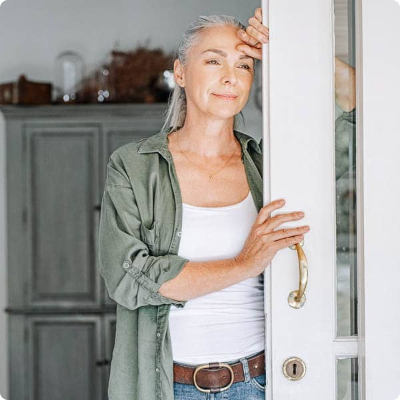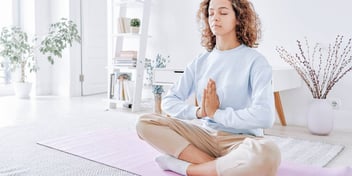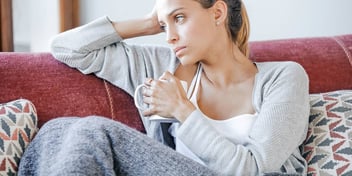How an Emotional First-Aid Kit Can Help during Divorce

Well, I don't know about you, but these last few years have been pretty challenging. From the emotional impact of world events to the big and small life stressors of every day, I (and most of the people I know) seem to have had it particularly rough lately. It was – except for some undeniable bright spots – a stretch of time where tons of stressors seemed to converge all at once and none of my own daily self-care routines felt sufficient to support me through the challenges of those days and weeks.
So that's when I turned to my emotional first aid kit – a set of practices, behaviors, and creative interventions I've cultivated over the years that helps me support my body, mind, heart, and soul when times are particularly tough and I need to ramp up my self-care big time.
All of the tools in my emotional first aid kit are unique (read: wicked quirky) and super, almost inexplicably effective for me. It's taken me time to identify these tools and behaviors, and accept that they look different from what's usually prescribed in women's magazines (e.g., yoga, meditation, green juice), and it's definitely taken even more time to learn when I need to employ them (the most).
But having this set of strategies that I can now lean on when times are particularly tough is a big part of my own ongoing self-care and something I feel passionate about sharing and helping my clients to develop, too. So today I want to lead you through some inquiries to help you identify what might make it into your emotional first aid kit for those times when life just feels overwhelming.
Emotional first-aid kit: What it is and isn't
Just to recap, an emotional first aid kit is totally proverbial (no actual toolboxes required!). It's a set of unique practices, behaviors, and creative interventions designed to comfort, support, and bring relief to your body, mind, heart, and soul in particularly challenging times.
These are some tools you can pull out when it seems like everything's going wrong and your standard self-care routines just aren't cutting it for you anymore. An emotional first aid kit is an ongoing practice of self-awareness and self-care, supporting you in recognizing what you need, and getting curious and creative about how you can meet your needs through life's many ups and downs.
For the purposes of today's exercise, I'm going to walk you through the four areas for which we want to develop tools and invite you to identify two to three creative interventions for each area. This will the foundation of your own ever-evolving emotional first aid kit.
Body: Feel, nourish, and soothe
When life's tough times hit, we want to have some tools in our toolbox that we can use to help feel, nourish, and soothe our bodies. Now, this doesn't necessarily mean things like exercising for 20 minutes or drinking a daily green smoothie (though if that sounds like just what you need in tough times, rock on).
Instead, what I want you to start identifying are activities or practices you know that would help you get into your body and engage your five senses – smell, taste, touch, sight, and hearing – in a way that feels appropriate and helpful for you and you alone. For example, one of my emotional first aid body go-to's when my schedule's overly full and I'm feeling overwhelmed by life and professional commitments is hopping on my bike and riding it along the Bay while blaring Florence + The Machine's Shake it Out on repeat through my earbuds.
And while I absolutely love yoga and getting on my mat regularly, when I'm feeling particularly overwhelmed is the feeling of freedom that comes from riding my bike long and hard. That combined with the smell of the sea (once a Maine Islander, always a Maine Islander!) and the repeated reminder from Florence to shake my stress off does wonders for me. I don't know what your body-based tools will be, but here are some inquiries to help you brainstorm:
- What's the sort of stress you're experiencing?
- Do you feel trapped or too uncontained? What's a physical activity that can support giving you more space (if feeling trapped) or containment (if you're feeling uncontained)?
- What did your 8-year-old self most love to do with her body?
- What does your body crave when you're stressed? Touch? Childhood comfort food? Stretches? Connection with the earth? Space?
- Can you combine a few activities into one to engage several senses of your body at once? (e.g., music and movement?)
Mind: Still, center, focus
When stress hits, it's not unusual for our minds to feel frazzled, chaotic, and near-impossible to shut off. That's why it's important to have one or two practices or behaviors in your back pocket to help still, center, and focus your mind. And I don't know about you, but sometimes when I'm really having a tough time, 20 minutes of meditation just isn't really an option for me. Instead, what I've found to be particularly helpful is listening to the chanting of Deva Premal and The Gyuto Monks of Tibet and tidying up my cottage's kitchen.
For whatever reason, the combination of this music and the act of tidying something a little messy brings so much stillness and calm to my mind when I'm frazzled and just can't still myself for 20 minutes of meditation. Now it's your turn:
- What creative, alternative actions and behaviors might help you to still, center, and focus your mind?
- Is there a task you do with your hands that seems to calm your mind? Does noticing your breath feel helpful to you?
- Are there certain sounds that soothe your mind? Can you Google or Spotify those sounds up and create a playlist for yourself?
- If your mind feels frazzled, what action can you take that's soothing? If your mind (and life) feels untidy or unruly? How can you do something to help bring order to your mind?
Heart: Notice, express, feel
When life feels overwhelming and you're having a hard time, it's critical to have some tools in your emotional first aid kit to support you in noticing, expressing, and honoring your feelings. Like I've mentioned before, appropriately feeling and expressing our feelings is foundational to good mental health and to living a more enlivened, enriched life.
And so, when I'm having a hard time, my go-to tool to support my heart is relying on my Big Seven – my go-to beloved friends, family members, and mentors, people with who I feel totally safe and supported in being honest and vulnerable with. For me, no heart-supporting tool is more effective than sharing what's going on with someone who loves me. But what about you?
- Who in your life could you safely share your feelings with? A friend? A family member? Your therapist? (yes, a therapist can be a tool in your emotional first aid kit!)
- What helps you get in touch with your feelings? If you need some tips, check out this blog post I wrote.
- Is there someone you need to express something difficult to? If you need some support around this, check out these tips or schedule a couples or family therapy session.
- What else do you know helps your heart when you're going through tough times?
Soul: Connect, ground, trust
Last, but not least, I believe that designing tools that nourish and support our soul is an incredibly important part of any emotional first aid kit. Define the soul however you want – spirit, essence, psyche, etc; I personally believe that our soul is the unchangeable, indestructible part of us that breathes and lives us, the part of us that always was and always will be and that we often forget to consciously tend to in the minutiae of our everyday human lives.
For me, I know that consciously feeding my soul helps me better weather whatever it is I'm going through. And one of the (quirky) tools that I have in my emotional first aid kit for this is the combination of listening to Dr. Clarissa Pinkola Estes' audiobooks and drinking hot chocolate. For whatever reason, the combination of Jungian mythos (did you know that stories speak straight to the soul?) and liquid chocolate (I don't think this needs an explanation) is a soul-strengthener for me of the highest order. Even more effective if it's outside watching the ocean or the sunset. So let's see what might help you:
- When is it that you feel the stirrings of your soul? What place, activity, sound, or action helps you feel this part of you?
- Does nature feed you? What places help you connect to your soul the strongest?
- Do you have a spiritual community or faith group that you can lean on? What people serve as guides and mentors in your life that help nourish your soul?
- What high-quality inspirational or instructional content can you read or listen to that can guide you in connecting to your soul?
How to put your emotional first-aid kit to use
I want you to go back through this blog post and write down two to three ideas for body, mind, heart, and soul that might be tools you can use in your own emotional first aid kit. I'm sure you'll come up with something great!
FAQ
What is an emotional first aid kit?
It’s a collection of tools, reminders, and comforting items to help regulate emotions during tough times.
Why is an emotional first aid kit helpful during divorce?
It offers quick relief and a sense of grounding when emotions feel overwhelming.
What can I include in an emotional first aid kit?
Comforting items, playlists, notes of encouragement, grounding practices, or anything that brings you calm.
How do I use an emotional first aid kit?
Turn to it in moments of stress or sadness, and use the items to reset and find balance.
Can an emotional first aid kit support long-term healing?
Yes. Consistent use builds resilience and strengthens coping habits.
How to Create and Use an Emotional First Aid Kit During Divorce
Choose comforting items
Gather small items that help you feel safe and calm.
Add emotional support tools
Include affirmations, journaling prompts, or personal notes of encouragement.
Incorporate grounding practices
Have breathing exercises or mindfulness prompts ready for stressful moments.
Personalize your kit
Make the kit reflect your personality and what soothes you best.
Use the kit regularly
Practice with it often so it becomes a reliable source of comfort and resilience.
Additional Resource
Self Care For People of Color After Emotional and Psychological Trauma is a terrific article not only for people of color but for anyone who is an ally and/or who wants a deeper dive into the physiology of trauma and the criticality of engaging in self-care after traumas (be they racial or otherwise) occur.

Ready to re-discover yourself with coaching or therapy?
Our FREE checklist can help you find the right fit.
Download our checklist of questions to ask a potential therapist or coach today.



